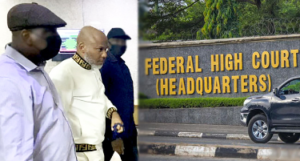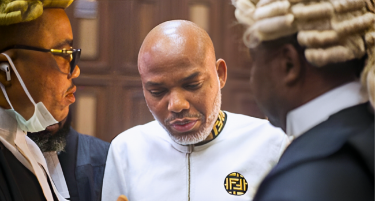The Attorney-General of the Federation and Minister of Justice, Lateef Fagbemi, recently addressed the complex and contentious case of Nnamdi Kanu, the detained leader of the proscribed Indigenous People of Biafra (IPOB). During a Sectoral Ministerial Briefing on the first anniversary of President Bola Tinubu’s administration, Fagbemi emphasized that Kanu’s case is a particularly challenging one, which necessitates resolution by a competent court of law.
In his remarks, Fagbemi highlighted the importance of allowing the judicial process to run its course, underscoring that Kanu’s situation is markedly different from that of other political detainees, such as Omoyele Sowore. He affirmed that Kanu is being held by constitutional provisions and noted that the matter remains before the court, where it should be duly adjudicated.
Fagbemi also pointed out the Federal Government’s notable achievements in the realm of justice and law enforcement over the past year, citing the successful conviction of 250 individuals for terrorism and other serious criminal offenses. This underscores the government’s commitment to upholding the rule of law and ensuring justice is served in complex legal cases, such as that of Nnamdi Kanu.
The legal team representing Kanu has been proactive in challenging the charges against him. On Tuesday, Kanu’s lawyers filed a Preliminary Objection at the Federal High Court in Abuja. They urged the presiding judge, Justice Binta Nyako, to decline jurisdiction over several of the charges. Specifically, they questioned the court’s jurisdiction to try Kanu for offences listed in Counts 1, 2, 4, 5, and 8, arguing that the legal grounds for these charges are unconstitutional.
The defense team raised several critical points in their objection. They referenced two international tribunal decisions that opposed Kanu’s arrest, detention, prosecution, and trial. According to the Nigerian constitution, these decisions are binding on the court. Additionally, they argued that the law underpinning these charges has been repealed and lacks supporting evidence, constituting an abuse of the court process.
 Further complicating matters, the defense contested Count 15, arguing that it does not comply with the Administration of Criminal Justice Act and falls outside the territorial jurisdiction of the court. They also noted that this count is unsupported by any proof of evidence or relevant law. Moreover, the defense contended that Count 3 is unconstitutional as it seeks to punish Kanu for actions that were not considered crimes at the time they were committed, further arguing that it represents an abuse of the court process.
Further complicating matters, the defense contested Count 15, arguing that it does not comply with the Administration of Criminal Justice Act and falls outside the territorial jurisdiction of the court. They also noted that this count is unsupported by any proof of evidence or relevant law. Moreover, the defense contended that Count 3 is unconstitutional as it seeks to punish Kanu for actions that were not considered crimes at the time they were committed, further arguing that it represents an abuse of the court process.
Earlier in the week, Justice Nyako had dismissed Kanu’s request for the restoration of his revoked bail. Kanu had sought either house arrest or transfer from the custody of the Department of State Services (DSS) to a regular prison. The dismissal of this request keeps Kanu under the stringent custody of the DSS, reflecting the ongoing judicial scrutiny and the seriousness with which the Nigerian legal system is treating this high-profile case.
The complexities surrounding Nnamdi Kanu’s legal battles reflect broader tensions and issues within Nigeria. His case has been a focal point of ethnic and political discourse, particularly concerning the agitation for Biafran independence. The court’s handling of this case will have significant implications for Nigeria’s legal and political landscape, potentially setting precedents for how similar cases are managed in the future.
Attorney-General Fagbemi’s statements underscore the government’s stance on adhering strictly to legal frameworks and the importance of the judiciary in resolving such sensitive matters. As Kanu’s legal team continues to mount their defense, the case remains a pivotal issue within Nigeria’s judicial and political spheres. The outcome will likely influence not just the fate of Nnamdi Kanu but also the broader approach to handling separatist movements and political dissent within the country.
As the legal processes unfold, the nation watches closely, with stakeholders from various sectors keenly observing the judiciary’s decisions. The resolution of this case could either mitigate tensions or further inflame them, depending on how justice is perceived to be served. For now, all eyes remain on the courts, awaiting the next developments in this high-stakes legal drama.




